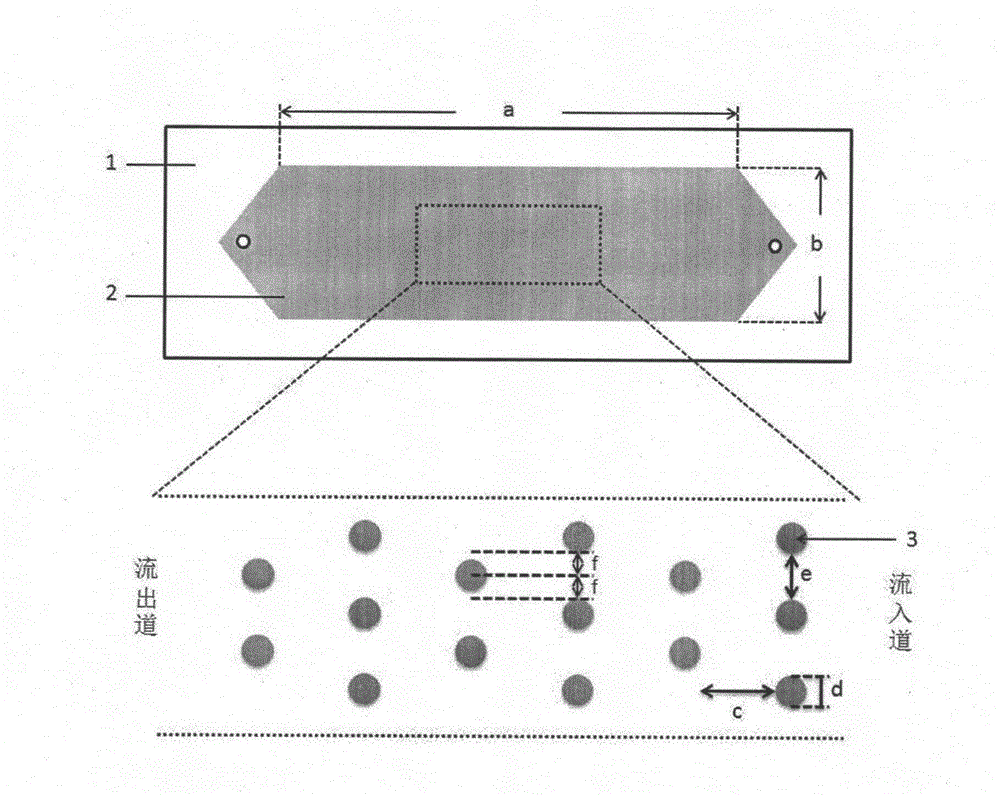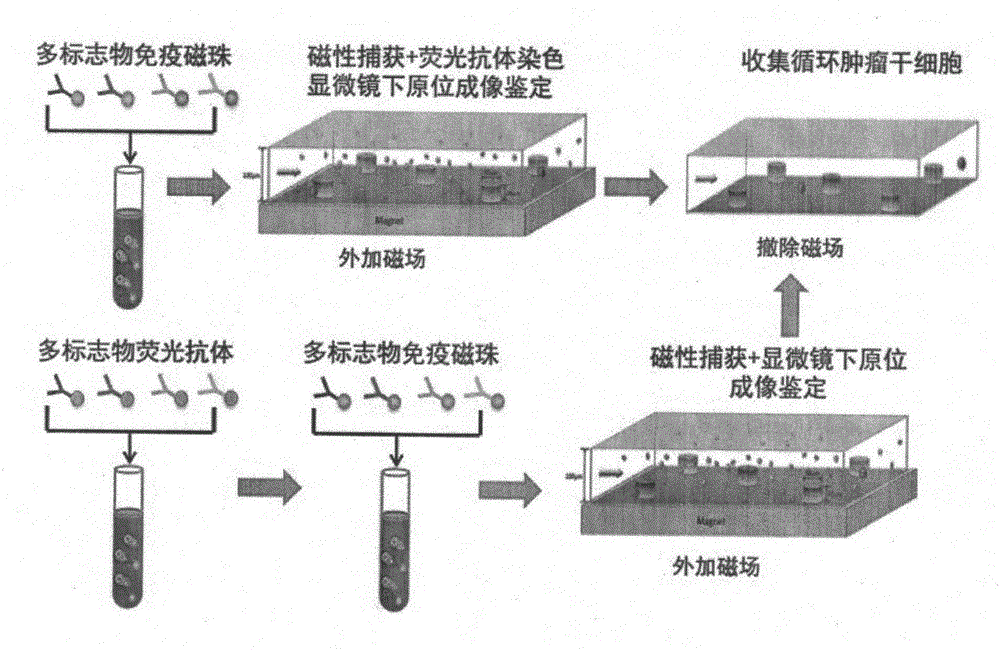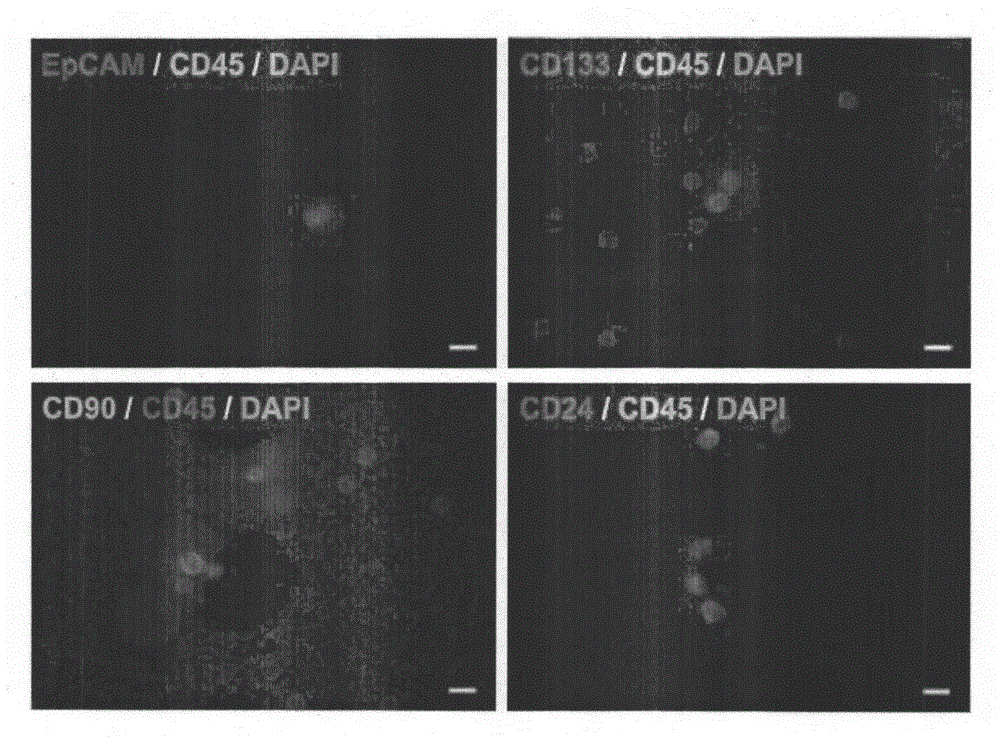Circulating tumor stem cell detection kit based on magnetic beads and microfluidic chip
A microfluidic chip and tumor stem cell technology, which is applied in the field of circulating tumor stem cell detection kits, can solve the problems of chip integration obstacles, multiple steps, cross-contamination, etc., and achieve high sensitivity and specificity, convenient and fast operation, and easy collection Effect
- Summary
- Abstract
- Description
- Claims
- Application Information
AI Technical Summary
Problems solved by technology
Method used
Image
Examples
Embodiment 1
[0031] 1. A circulating tumor stem cell detection kit based on magnetic beads and a microfluidic chip, consisting of the following components:
[0032] (1) Microfluidic chips, such as figure 1As shown, it is a schematic diagram of the microfluidic chip structure. The microfluidic chip microfluidic chip includes a glass chip substrate 1, and a microfluidic chip with a length a of 50 mm and a width b of 17 mm is provided on the glass chip substrate 1. control channel 2, and a soft magnetic microarray is arranged in the microfluidic control channel 2. The soft magnetic microarray is composed of nickel-iron alloy cylinders 3, and two adjacent rows of nickel-iron alloy cylinders 3 are arranged alternately. The distance c between two adjacent rows of nickel-iron alloy cylinders 3 is 100 μm, the diameter d of the nickel-iron alloy cylinders 3 is 30 μm, and the distance e between two adjacent rows of nickel-iron alloy cylinders 3 in each row is 50 μm. The shortest vertical distance...
Embodiment 2
[0048] 1. A circulating tumor stem cell detection kit based on magnetic beads and a microfluidic chip, the composition of which is the same as in Example 1.
[0049] 2. The preparation of the microfluidic chip is the same as in Example 1.
[0050] 3. Prepare blood samples mixed with Hep3B cell line to simulate blood samples containing circulating tumor stem cells:
[0051] (1) Hep3B cell line (purchased from Shanghai Life Science Park, Chinese Academy of Sciences, hepatocellular carcinoma tumor cells, the positive rates of Hep3B cells expressing EpCAM, CD133, CD90 and CD24 were 99.8%, 98%, 0.2% and 1%, respectively. In the embodiment, Hep3B cells are used as circulating tumor cells in the incorporation method). Take 4×10 7 Hep3B cells, 1×10 per copy 7 The cells were mixed with the following fluorescent antibodies at a ratio of 1:100: CD24-PE (Catalog no.130-095-403, Milteny Biotec), CD90-FITC (Catalog no.130-095-953, Milteny Biotec), EpCAM-PE (Catalog no.130-091-253, Milte...
PUM
| Property | Measurement | Unit |
|---|---|---|
| length | aaaaa | aaaaa |
| width | aaaaa | aaaaa |
Abstract
Description
Claims
Application Information
 Login to View More
Login to View More - R&D
- Intellectual Property
- Life Sciences
- Materials
- Tech Scout
- Unparalleled Data Quality
- Higher Quality Content
- 60% Fewer Hallucinations
Browse by: Latest US Patents, China's latest patents, Technical Efficacy Thesaurus, Application Domain, Technology Topic, Popular Technical Reports.
© 2025 PatSnap. All rights reserved.Legal|Privacy policy|Modern Slavery Act Transparency Statement|Sitemap|About US| Contact US: help@patsnap.com



